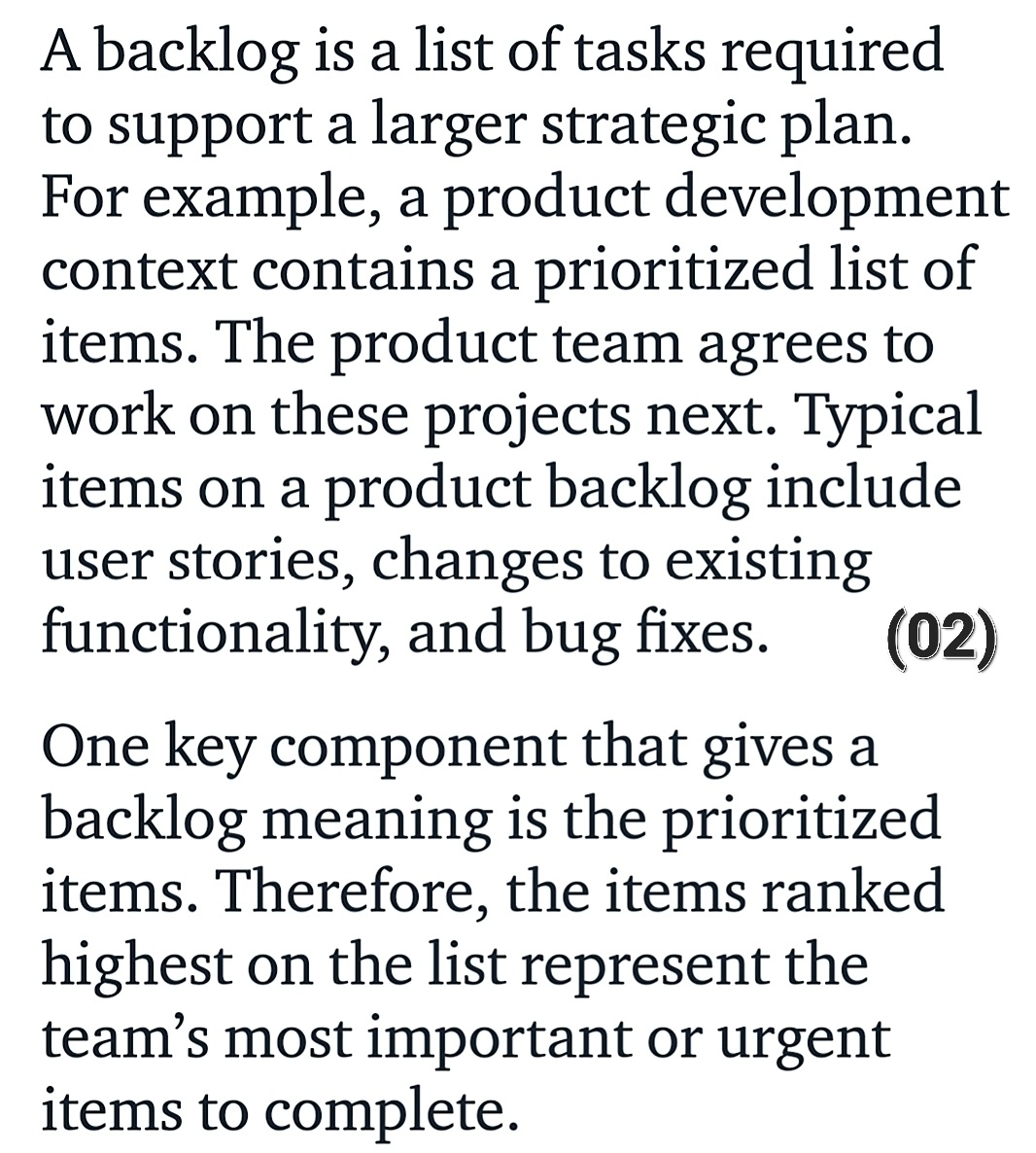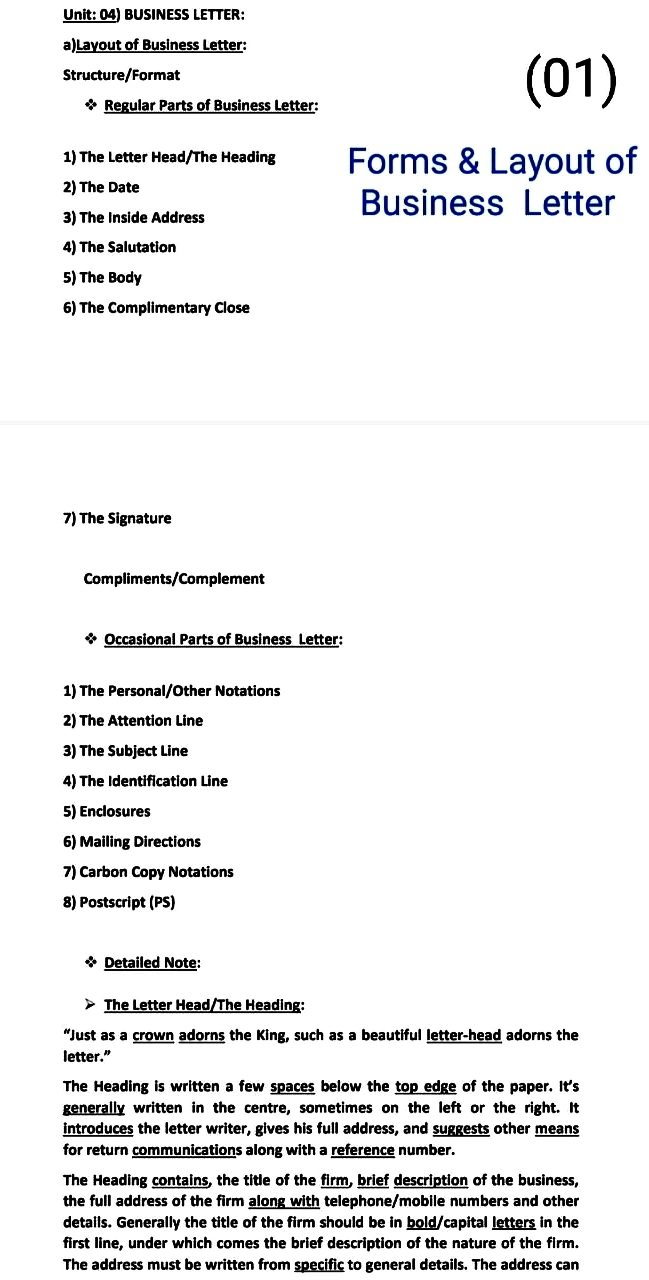BCOM-V/BUSINESS COMMUNICATION-CC303/WORDS USED IN BUSINESS CORRESPONDENCE
BCOM-5/BUSINESS COMMUNICATION
Unit: IV(B)
*WORDS USED IN BUSINESS CORRESPONDENCE*
👇
(01)Agenda:
An agenda is a list of meeting activities in the order in which they are to be taken up, beginning with the call to order and ending with adjournment. It usually includes one or more specific items of business to be acted upon. It may, but is not required to, include specific times for one or more activities.
(02)Backlog:
👇
(03)Bankruptcy:
Bankruptcy is a legal process through which people or other entities who cannot repay debts to creditors may seek relief from some or all of their debts. In most jurisdictions, bankruptcy is imposed by a court order, often initiated by the debtor.
Bankrupt is not the only legal status that an insolvent person may have, and the term bankruptcy is therefore not a synonym for insolvency.
(04)Beneficiary:
A beneficiary in the broadest sense is a natural person or other legal entity who receives money or other benefits from a benefactor. For example, the beneficiary of a life insurance policy is the person who receives the payment of the amount of insurance after the death of the insured.
(5)Black Market:
A black market, underground economy, or shadow economy is a clandestine market or series of transactions that has some aspect of illegality or is characterized by noncompliance with an institutional set of rules. If the rule defines the set of goods and services whose production and distribution is prohibited or restricted by law, non-compliance with the rule constitutes a black market trade since the transaction itself is illegal.
(06)A Breach of Contract:
A breach of contract occurs when one party fails to fulfill its obligations as outlined in the contract. That could include something relatively minor, such as being a couple of days late on a payment, or something more serious.
(07)Budget:
A budget is a calculation plan, usually but not always financial, for a defined period, often one year or a month. A budget may include anticipated sales volumes and revenues, resource quantities including time, costs and expenses, environmental impacts such as greenhouse gas emissions, other impacts, assets, liabilities and cash flows. Companies, governments, families, and other organizations use budgets to express strategic plans of activities in measurable terms.
A budget expresses intended expenditures along with proposals for how to meet them with resources. A budget may express a surplus, providing resources for use at a future time, or a deficit in which expenditures exceed income or other resources.
(08)Collateral Security:
Collateral security is any property-movable or immovable property offered for securing a loan.
As opposed to primary security which is created/purchased out of loan granted to the applicant, collateral is offered when the security value is lower and does not cover the loan amount granted.
(09)Commission:
A commission is a payment that an employee makes based on a sale. Some employees earn commission in addition to their base income, while other employees work only on commission. When an employee earns a commission, they make a portion of the sale in income.
(10)Deficit:
A deficit is an amount by which one resource, especially money, falls short of what is required. If expenditures exceed income, imports exceed exports, or liabilities exceed assets, a deficit exists. A deficiency or loss is synonymous with a deficit, and it is the opposite of a surplus.
(11)Entrepreneurship:
Entrepreneurship is the creation or extraction of economic value. With this definition, entrepreneurship is viewed as change, generally entailing risk beyond what is normally encountered in starting a business, which may include other values than simply economic ones.
(12)Exchange Rate:
An exchange rate is the rate at which one currency can be exchanged for another between nations or economic zones. It is used to determine the value of various currencies in relation to each other and is important in determining trade and capital flow dynamics.
(13)Fiscal:
Fiscal means of or relating to money and especially to the money a government, business, or organization earns, spends, and owes.
(14)Franchise:
A franchise is a type of business that is owned and operated by an individual (franchisee) but that is branded and overseen by a much larger—usually national or multinational—company (the franchisor). Many of the stores and restaurants that you see every day are franchises.
(15)Freight:
Freight shipping is defined as the process of transporting commodities, goods and cargo by land, sea or air. Freight itself can be defined as the goods transported by truck, train, ship or plane. Freight shipping is an important part of many business operations.
(16)Gross:
Gross means the total or whole amount of something, whereas net means what remains from the whole after certain deductions are made.
(17)Subsidy:
A subsidy is a benefit given to an individual, business, or institution, usually by the government. It can be direct (such as cash payments) or indirect (such as tax breaks). The subsidy is typically given to remove some type of burden, and it is often considered to be in the overall interest of the public, given to promote a social good or an economic policy.
(18)Lease:
A lease is a contractual arrangement calling for the user to pay the owner for the use of an asset. Property, buildings and vehicles are common assets that are leased. Industrial or business equipment are also leased. Basically a lease agreement is a contract between two parties: the lessor and the lessee.
(19)Margin:
The word ‘margin’ has several meanings, both in the world of business and finance, as well as other situations. It can refer to the difference between the cost of a product and how much you sell it for. It can also mean the amount by which revenue from total sales exceeds costs in a business.
(20)Mortgage:
A mortgage is an agreement between you and a lender that gives the lender the right to take your property if you fail to repay the money you've borrowed plus interest.
Mortgage loans are used to buy a home or to borrow money against the value of a home you already own.
(21)Negotiable:
Negotiable is used to describe the price of a good or a contract that is not firmly established, meaning the terms can be modified. Negotiable can refer to a legal contract in which all or a portion of the terms can be adjusted by the parties involved.
(22)Pledge:
A pledge is a bailment that conveys possessory title to property owned by a debtor (the pledgor) to a creditor (the pledgee) to secure repayment for some debt or obligation and to the mutual benefit of both parties.The term is also used to denote the property which constitutes the security.The pledge is a type of security interest.
(23)Power of Attorney:
The term power of attorney (POA) refers to a legal authorization that gives a designated person the power to act for someone else. As such, a POA gives the agent or attorney-in-fact the authority to act on behalf of the principal.
(24)Promissory Note:
A promissory note, sometimes referred to as a note payable, is a legal instrument, in which one party promises in writing to pay a determinate sum of money to the other, either at a fixed or determinable future time or on demand of the payee, under specific terms and conditions.
(25)Rebate:
In marketing, a rebate is a form of buying discount and is an amount paid by way of reduction, return, or refund that is paid retrospectively. It is a type of sales promotion that marketers use primarily as incentives or supplements to product sales. Rebates are also used as a means of enticing price-sensitive consumers into purchasing a product. The mail-in rebate (MIR) is the most common
(26)Recession:
Recession, in economics, a downward trend in the business cycle characterized by a decline in production and employment, which in turn causes the incomes and spending of households to decline. Even though not all households and businesses experience actual declines in income, their expectations about the future become less certain during a recession and cause them to delay making large purchases or investments.
(27)Reimbursement:
Reimbursement is compensation paid by an organization for out-of-pocket expenses incurred or overpayment made by an employee, customer, or another party. Reimbursement of business expenses, insurance costs, and overpaid taxes are common examples. However, unlike typical compensation, reimbursement is not subject to taxation.
(28)Syndicate:
A syndicate is a self-organizing group of individuals, companies, corporations or entities formed to transact some specific business, to pursue or promote a shared interest.
(29)Trade Mark:
A Trade Mark is a type of intellectual property consisting of a recognizable sign, design, or expression that identifies products or services from a particular source and distinguishes them from others. The trademark owner can be an individual, business organization, or any legal entity. A Trade Mark may be located on a package, a label, a voucher, or on the product itself. Trade Marks used to identify services are sometimes called service marks.
(30)Waive:
To “waive” is to forego something. It is an act of voluntarily giving up a right, and can apply to a variety of legal situations including knowingly giving up a legal right such as a speedy trial, a jury trial, giving up some rights in a settlement talk, or not enforcing a term of contract. To “waive” can remove a real or potential liability for another party in the contract. This can either be done in written form or some form of action.
-----×-------×-------×------×-----


